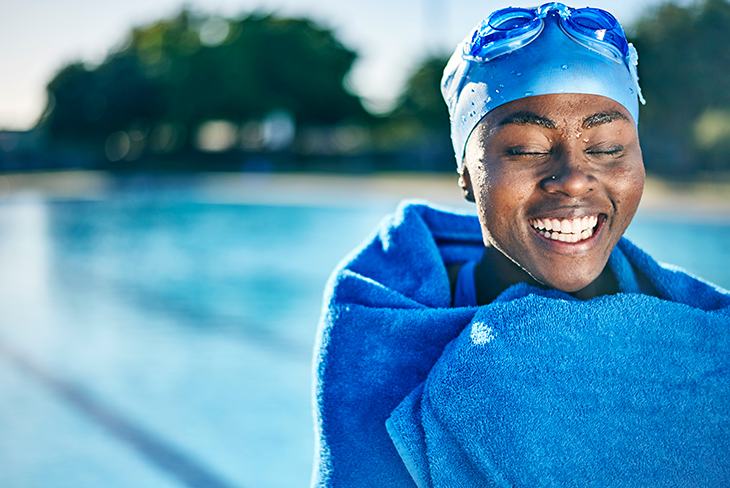Sign up for a mental health workout

From depression and anxiety to attention deficit hyperactivity disorder (ADHD) and stress, exercise, in all its forms, is a powerful and effective tool in boosting mental wellbeing and focusing the mind and body on healing. Exercise for your mental wellbeing with these activities.
We’re just going to go ahead and say it: 2020 was a challenging year. With no choice but to stay confined to their homes, South Africans turned to exercise to relieve boredom, stay fit and maintain mental wellbeing. Business Insider reports that with at-home exercises like yoga and Pilates, and ballet studios offering live-streamed classes, and gym chains and medical aids sharing pre-recorded workout videos, people could engage in regular exercise.
‘There’s so much more to exercise than just keeping fit,’ explains physiotherapist Oasis Sejake at Life Riverfield Lodge, a Life Mental Health Unit. ‘In fact, most types of exercise show that there’s a direct benefit of exercise on mental health.’ Oasis recommends:
1. Yoga
The trendiness of yoga shouldn’t undermine its benefits and the fact that it’s an effective and healthy workout, says Oasis. The discipline is especially good for people who are tired and feeling the effects of burnout. ‘Yoga practices often stimulate the parasympathetic nervous system, which counters stress, bringing the body into a relaxed state,’ explains Oasis. ‘Quieting the mind can occur through practices such as slow diaphragmatic breathing, which is an essential part of many yoga practices.’ And more than being a tool for relaxation, Oasis also found a study that showed that yoga significantly reduced perceived anxiety levels in women who suffered from anxiety disorders. Sign. Us. Up.
2. Dancing
Moving your body to music can greatly improve mood and energy levels – whether you do an aerobics class, take dance lessons or just move to your favourite song in your living room. In fact, one study done by Örebro University Hospital in Sweden found that young girls can literally dance or exercise for good mental health. Study researchers did this by observing over 100 teenage girls who were struggling with depression, anxiety, fatigue, headaches, and back pain. Half of the study subjects were sent to weekly dance classes, while the other half continued their lives as normal, with no dance classes. The result? Those who took dance classes reported a boost in mood and self-esteem. As if we need more reason to crank up the radio and dance around in the living room!
3. Cycling
There are multiple studies proving that aerobic exercises reduce anxiety and depression, so while it may be tempting to stay in and binge your favourite series, getting regular exercise is far more beneficial. So, why cycling specifically? Well, according to Harvard Health Publishing, simply spending time in nature is a great way to boost your mood, so cycling on a nature trail, for example, is one of the best exercises for overall health. Oasis agrees: ‘Research in a growing scientific field called ecotherapy has shown a strong connection between time spent in nature and reduced stress, anxiety and depression.’ So, grab your helmet, head into the outdoors and witness the change in your mental wellbeing, mood and energy levels – even how well you sleep.
4. Swimming
Swimming is popular with kids and as a way to cool down in the warmer months, but the mental benefits of this exercise are also well documented. ‘Swimming stimulates the brain to release neurochemicals which have a feel-good element that can reduce the effects of stress,’ says Oasis, ‘but more than that, the water’s buoyancy has a soothing effect on the body. Aquatic physiotherapy is beneficial as a recovery technique after injury, and the various swimming strokes induce rhythmic breathing, which helps to reduce heart rate and lower blood pressure.’ If you can find a heated pool, even better… ‘Immersion in warm water facilitates circulation and further promotes good blood flow to the brain, which positively affects cognitive function,’ explains Oasis.
If you feel overwhelmed or stressed by the challenges in your life, speak to a mental health professional. If you have any existing medical conditions, don’t forget to get the all-clear from your general practitioner or specialist before starting to exercise. If you suffer from any physical ailments, or have existing injuries, get advice from a trained physiotherapist.
Life Mental Health is a leading provider of private mental health services at nine facilities in four provinces across the country.
The content provided is not intended to be a substitute for professional medical advice, diagnosis or treatment and does not cover every aspect of mental health. Consult a doctor or your nearest emergency unit if you are concerned about your own or a loved one’s mental health. The information is shared on condition that readers will make their own determination, including seeking advice from a qualified healthcare professional. E&OE. Life Healthcare Group Ltd does not accept any responsibility for any loss or damage suffered by the reader as a result of the information provided.

